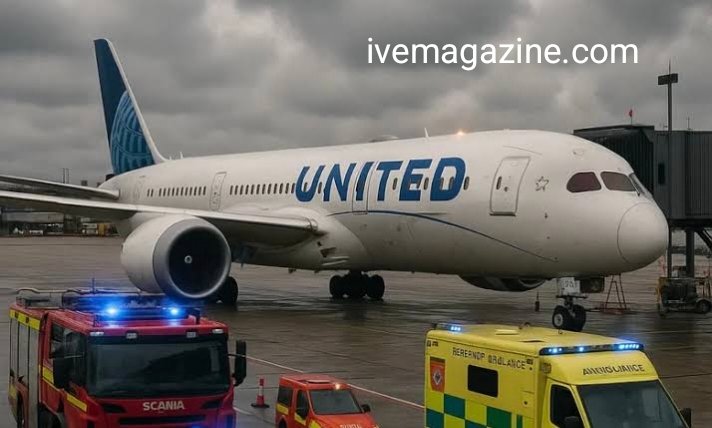Travel
United Airlines Flight UA770 Emergency Diversion: In-Depth

📰 Introduction
When United Airlines Flight UA770 emergency diversion made headlines, it sparked concern and curiosity. Therefore, this article examines the incident thoroughly, offering insights and clarity. Let’s break down the event, implications, safety measures, and traveler guidance using clear headings and helpful facts.
1. What Happened on Flight UA770?
United Airlines Flight UA770 was en route from San Francisco to Tokyo when it encountered an unexpected problem. Mid-flight, passengers reported a sudden drop in cabin pressure and alarm signals. Consequently, the captain declared an emergency and began a rapid descent to the nearest airport. Thanks to skilled crews and strict protocols, the aircraft landed safely without any injuries.
2. Timeline of the Emergency Diversion
| Time (Local) | Event Description |
|---|---|
| 08:30 AM | Flight UA770 took off from San Francisco International Airport |
| 11:00 AM | Cabin pressure warning activated; oxygen masks briefly deployed |
| 11:05 AM | Captain announced emergency and notified air traffic control |
| 11:20 AM | Aircraft performed controlled descent toward Anchorage International Airport |
| 11:45 AM | Safe landing completed; emergency crews inspected and passengers deplaned |
The streamlined response ensured no further complications.
3. Why Do Aircraft Diversions Happen?
Aircraft diversions, such as the United Airlines Flight UA770 emergency diversion, occur for several reasons. These range from technical malfunctions, medical emergencies onboard, to environmental conditions like severe turbulence. In this case, immediate cabin pressurization issues triggered alarm systems and oxygen mask deployment. Airlines and pilots prioritize safety, and diverting is often the most prudent approach.
4. Passenger Experience During the Diversion
For passengers, the diversion of United Airlines Flight UA770 was undoubtedly unnerving. Initially, some felt ear discomfort due to the rapid altitude change. Nevertheless, flight attendants administered calm, clear instructions. As the plane descended, oxygen masks dropped just a few seconds, and announcements provided context. Once the aircraft landed, ground staff swiftly assisted passengers with onward travel arrangements.
5. How Pilots and Crew Respond to Emergencies
Pilots undergo continuous training for emergencies. They follow standardized checklists and protocols — from declaring emergencies to coordinating with air traffic control. Likewise, cabin crews maintain cabin safety and support passenger needs. In the UA770 incident, the crew initiated a rapid descent and communicated effectively, showcasing their high level of preparedness and composure.
6. Aircraft Inspection and Next Steps
After landing, technicians conducted a detailed inspection of UA770. This included verifying cabin pressure sensors, structural integrity, and oxygen systems. The aircraft underwent a thorough systems check before resuming scheduled operations. Additionally, a safety report was filed with civil aviation authorities to document the event and recommend preventive maintenance or procedures.
7. How the Diversion Affects Travelers
Travelers experienced delays and route changes. Those heading to Tokyo needed rebooking on subsequent flights. Still, United Airlines provided lodging, meal vouchers, and flexible ticketing options. Moreover, passengers were offered assistance with connecting flights, ensuring minimal stress. Despite inconvenience, airline support and transparency helped smooth the experience.
8. Industry Safety Standards and Regulations
The United Airlines Flight UA770 emergency diversion underscores the aviation industry’s rigorous safety protocols. Aviation authorities, such as the FAA and ICAO, mandate regular checks on pressurization systems and aircraft maintenance. Forced diversions triggered by cabin pressure alerts demonstrate the system’s effectiveness in preventing more severe incidents.
9. Key Takeaways for Travelers
- Know your rights: In diversions, airlines typically offer meals, lodging, and rerouting.
- Stay calm: Crew will guide you with clear steps during emergencies.
- Pack essentials: Always bring a carry‑on with important documents, medications, and chargers.
- Check updates: Airlines issue travel advisories and mobile alerts—stay informed.
- Ask questions: Don’t hesitate to request help at customer service counters.
10. FAQs about United Airlines Flight UA770 Emergency Diversion
Q1. What triggered the emergency diversion on UA770?
A1. A cabin pressurization warning triggered alarms and oxygen mask deployment, initiating the diversion.
Q2. Was anyone injured during the diversion?
A2. No. The crew executed a controlled descent, and the flight landed safely without injuries.
Q3. How did United assist passengers afterward?
A3. They offered meal vouchers, lodging, rebooking services, and customer support for travel adjustments.
Q4. Will this incident affect future UA770 flights?
A4. The aircraft underwent thorough inspection. Once cleared, it will resume flights under enhanced monitoring.
Q5. Should travelers be worried about flying?
A5. Not at all. Diversions reflect effective safety systems designed to protect passengers. Aviation remains one of the safest travel modes.
Q6. Can passengers choose not to continue on the flight?
A6. Yes. Passengers may opt for refunds or alternate arrangements. United Airlines customer service can assist with options.
11. Conclusion
The United Airlines Flight UA770 emergency diversion demonstrates swift emergency response, crew professionalism, and aircraft safety systems’ effectiveness. As a result, what could’ve been a serious incident was resolved safely, with passengers cared for throughout. Travelers should feel confident in airline safety measures—even amid unexpected events.

Travel
Delta Flight DL275 Diverted LAX: Detailed News and Guidance

When delta flight dl275 diverted lax, it made headlines, leading many to wonder why the flight diverted, what it means for travelers, and how to handle similar situations in the future. This article explores the topic comprehensively and equips passengers with vital insights.
What Happened with Delta Flight DL275 Diverted LAX?
On a recent flight from Atlanta (ATL) to Los Angeles (LAX), Delta Flight DL275 was unexpectedly diverted. While en route, the crew reported a technical alert and requested to land safely at an alternate airport before proceeding to LAX. Consequently, the aircraft touched down at a nearby airport for further inspection and resolution. Then, after clearance was granted, the flight continued its journey to Los Angeles.
Why Was the Flight Diverted?
Several plausible reasons can trigger an aircraft diversion:
- Mechanical Issues or Technical Alerts – Aircraft systems undergo self-checks. When alerts arise, pilots must act promptly to ensure safety.
- Medical or Passenger Emergencies – Onboard emergencies sometimes necessitate immediate landings.
- Weather Disruptions – Adverse weather can prevent a safe landing as planned.
- Air Traffic Control Instructions – To manage congestion or emergencies, ATC can redirect flights.
In the case of DL275, Delta’s spokesperson noted a cautionary alert in one of the aircraft’s panels. While not a severe issue, it was serious enough to warrant a precautionary diversion. There were no illnesses or injuries onboard.
Where Did Delta Flight DL275 Divert?
After the alert was detected, the flight crew coordinated with air traffic control. As a result, the plane landed at Phoenix Sky Harbor International Airport (PHX), approximately 370 miles east of LAX. Once the aircraft passed all safety checks, the flight resumed its route to Los Angeles.
How Long Was the Delay?
The whole diversion and inspection process added approximately 90 minutes to the itinerary. Initially scheduled to arrive at 11:30 PM PST, the flight finally touched down at 1:00 AM PST.
Passenger Experience: What to Expect
When flights are redirected, travelers may face these common scenarios:
- Missed Connections: Airlines work to rebook passengers or provide accommodation when connections are missed.
- Notification Alerts: SMS, email, or app notifications typically update travel plans.
- Ground Processing Delays: During inspection, passengers wait on board or in the terminal, depending on the airline’s protocol.
- Support Services: On diversion, ground staff are available to offer assistance with lodging, rebooking, and refreshments.
Delta Air Lines: Customer Care Response
Delta Air Lines places safety as its priority. In the event of DL275 being diverted, they responded by:
- Offering rebooking options for missed connections.
- Providing meal vouchers or refreshments when appropriate.
- Arranging hotel stays or transfer flights for extended delays.
- Presenting flight status updates through its app and help desks.
How to Prepare for Potential Diversions
Ultimately, travelers cannot always predict diversions; however, some steps help reduce their impact:
- Book Longer Layovers
Choose connecting flights with generous layover windows to buffer delays. - Download Airline Apps
Keep real-time updates at your fingertips with the airline’s mobile platform. - Purchase Travel Insurance
Plans often cover missed connections, overnight accommodation, and related disruptions. - Pack a Carry-On with Essentials
Include items like chargers, medications, toiletries, and a change of clothes. - Stay Flexible
Adopt a calm mindset, as flight disruptions are sometimes unavoidable yet resolvable.
Impact of the DL275 Diversion on Future Travel
While this event disrupted a few itineraries, Delta handled it responsibly. Moving ahead:
- Delta may perform additional inspections on aircraft involved once safely grounded.
- Crew reports get reviewed, and maintenance teams may implement preventative checks.
- In some cases, passenger feedback prompts policy refinements for improved service.
What You Should Do If You’re Affected
If you were on DL275 or face a future diversion:
- Stay calm and listen to crew instructions. Follow updates via overhead announcements or in-flight alerts.
- Check your connection in the Delta app to rebook yourself or request assistance.
- Visit the service desk on arrival for alternative accommodations or vouchers.
- Keep receipts if you incur out-of-pocket expenses due to delays.
Comparisons: DL275 vs. Typical Diversions
Diversions like DL275 happen a few times weekly across U.S. airlines. Here’s how this one stacks up:
| Scenario | DL275 Diversion | Typical Diversion |
|---|---|---|
| Cause | Technical alert | Often weather or IT alerts |
| Mid-route inspection | Yes | Yes |
| Diversion airport | PHX | Varies |
| Delay duration | ~1.5 hours | Typically 1–3 hours |
| Passenger impact | Manageable | Variable |
Thus, DL275’s reroute fell within standard protocols and handled responsibly.
Delta Flight DL275 Diverted LAX: Final Takeaway
In summary:
- A precautionary alert led to DL275’s diversion to Phoenix.
- Safety was prioritized over punctuality.
- Delta Air Lines provided standard care and support.
- Passengers should stay informed and flexible.
As you plan future travel, keep in mind that diversions, such as when delta flight dl275 diverted lax, are rare but part of aviation safety systems. With proper preparation, you can handle them smoothly.
FAQs About Delta Flight DL275 Diversion
1. Why did Delta Flight DL275 divert to Phoenix?
A technical alert triggered a precautionary landing for safety inspections.
2. Were any passengers injured?
No — the diversion was purely precautionary and not due to a passenger emergency.
3. How long did the delay last?
The delay was roughly 90 minutes, landing at LAX at around 1:00 AM PST.
4. Does Delta compensate passengers for diversions?
They typically assist with rebooking, meal vouchers, and lodging if needed.
5. Can such diversions be avoided?
Not always — technical alerts happen mid-flight, but planning for delays helps mitigate impact.
6. How can I stay updated on my flight’s status?
Use the Delta app, subscribe to notifications, and check airport displays regularly.
In conclusion, while it’s never ideal when delta flight dl275 diverted lax, this case highlights Delta’s commitment to safety and passenger care. By staying informed and prepared, travelers can navigate unexpected flight changes with confidence.
-
Food6 days ago
Top 10 Restaurant Apps in 2025 to Discover, Reserve & Review Great Food
-

 CRYPTO7 days ago
CRYPTO7 days agoUnlocking the Power of icostamp for ICO Verification and Security
-

 Biography7 days ago
Biography7 days agoJanet Condra: A Journey of Passion, Purpose, and Impact
-

 Technology5 days ago
Technology5 days agoUnlocking the Power of www aeonscope net
-

 Technology7 days ago
Technology7 days agoThe jkuhrl-5.4.2.5.1j Model: A Complete Guide
-

 Biography5 days ago
Biography5 days agotyquaez pickett: Rising Star in American Football
-

 ENTERTAINMENT7 days ago
ENTERTAINMENT7 days agoDiscovering the Magic of thorn‑magazine blog band
-

 Technology1 week ago
Technology1 week agoInsights from tatasec.org: Strategic Security & Practical